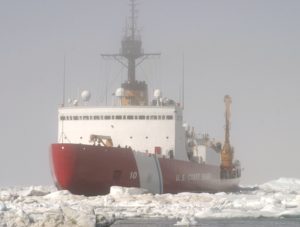by WorldTribune Staff, February 20, 2017
Russia, with nearly 40 icebreakers, is dominating the battle for the Arctic over the United States, which has just two of the vessels, a key Congressional leader said.
Rep. Duncan Hunter, a California Republican and chairman of the House Transportation and Infrastructure subcommittee on Coast Guard and maritime transportation, said he will press Congress and the White to increase the Coast Guard’s budget, which stands at $10 billion.

“Russia is working overtime to strengthen its Arctic presence while the U.S. is acting like a bystander and a nation without any similar strategic interests,” Hunter told The Washington Times. “With new icebreaking capability, we can exponentially strengthen our presence and guarantee year-round access for reasons of national security, commerce and research.”
The Coast Guard is seeking funding for three “medium” and three “heavy” icebreakers. It currently sails a 1970s Polar Star (heavy) and a 2000 Healy (medium) in what is an increasingly busy and contested region, Rowan Scarborough reported for the Times on Feb. 19.
Russia can call on 37 icebreakers, with four more under construction and eight more planned.
Coast Guard Vice Adm. Charles W. Ray, deputy commandant for operations, told the Times that the plan is to deliver the first heavy icebreaker by 2023.
“Timely replacement of our one, aging operational heavy icebreaker is vital to the advancement of U.S. interests,” Ray said. “We need to maintain a level playing field with other nations that have invested heavily in their national icebreaking capabilities.”
Hunter, in a letter to the Trump administration, said it is time to make the Coast Guard a higher priority.
“One of the most significant acquisition challenges facing the Coast Guard currently is the acquisition of heavy and medium icebreakers,” Hunter wrote to Defense Secretary James Mattis and Homeland Security Secretary John F. Kelly.
Russia continues to expand its presence in the 5 million square miles of Arctic ice and water, whose seafloor holds large gas and oil reserves.
Claims on Arctic territory are made by five coastal nations: Canada, Denmark, Norway, the U.S. (via Alaska) and Russia.
“Russia will definitely expand its presence in the Arctic,” Russian President Vladimir Putin said in 2011. “We are open for dialogue with our foreign partners and with all neighbors in the Arctic region. But we will naturally defend our own geopolitical interests firmly and consistently.”
Along with launching more icebreakers, Russia has opened 14 airfields and 16 deep-water ports in the region.
